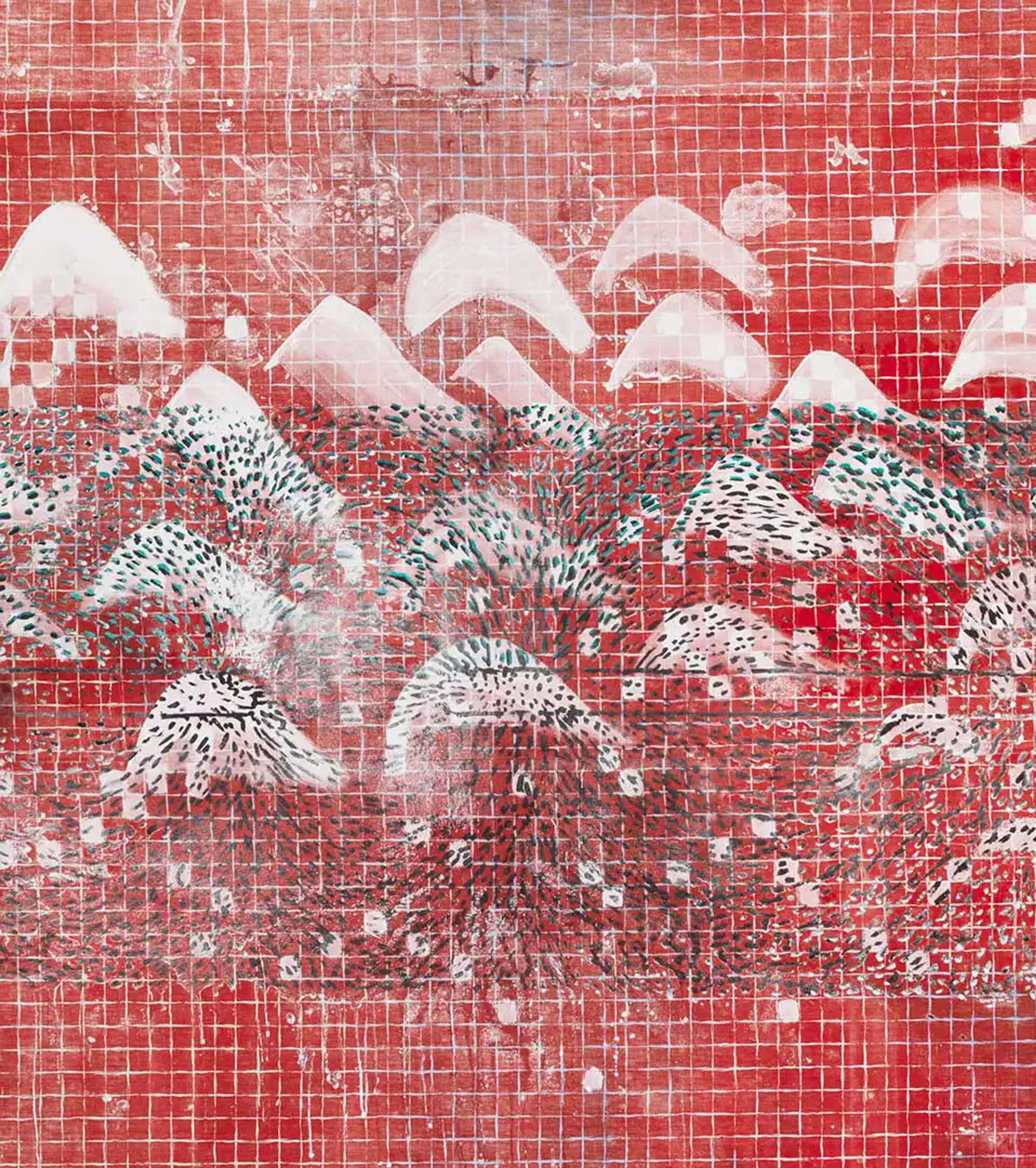October 2015
(New York & London) David Zwirner is pleased to announce the gallery's exclusive worldwide representation of The Estate of Sigmar Polke.
Sigmar Polke (German, 1941-2010) is considered to be one of the most significant and influential artists of the postwar era. His work was recently the subject of a critically acclaimed traveling retrospective that was held in 2014- 2015 at The Museum of Modern Art, New York; Tate Modern, London; and Museum Ludwig, Cologne.
As stated by David Zwirner, "Being able to work with The Estate of Sigmar Polke is a dream come true. Growing up in Cologne, I had the great fortune of meeting Sigmar and witnessing firsthand the enormous influence he exerted on his generation and the ones that followed. His creativity and curiosity knew no bounds, and his ability to innovate across different media is unparalleled. We are very much looking forward to presenting and exploring the different facets of his work as we develop exhibitions with the Estate. We are honored that the Estate has entrusted us to further Sigmar Polke’s important legacy."
The gallery is planning its first exhibition of Polke's work in collaboration with the Estate, which will take place in New York in May 2016.
Sigmar Polke is widely recognized for his multidisciplinary output of paintings, photographs, drawings, prints, objects, installations, and films. Characterized by a relentlessly experimental and inquisitive approach to a wide variety of styles and subject matter, the artist's work engages unconventional materials and techniques, and playfully defies social, political, and aesthetic conventions. Throughout his prolific career, Polke challenged the limits of his subject matter and materials in a rigorously inventive investigation of image-making and perception.
Polke was born in 1941 in Oels, Silesia, a region now part of modern day Poland; in 1945, at the end of World War II, his parents, aunt, and six siblings fled to Thuringia in central Germany. In 1953, the family escaped the Communist regime of the German Democratic Republic, arriving in Düsseldorf by way of West Berlin.
He received his first artistic training, beginning in 1959, as a glass painter, and in 1961 he enrolled at the Staatliche Kunstakademie Düsseldorf to study painting. In 1963, Polke, along with fellow students Manfred Kuttner, Konrad Lueg, and Gerhard Richter, organized an exhibition of their own work in an empty butcher’s shop in Düsseldorf. The show helped to launch the artists’ early careers and first introduced the term "Capitalist Realism." By the end of the decade, Polke would have solo exhibitions at such notable galleries as Galerie René Block, Berlin; Galerie Schmela, Düsseldorf; Galerie Heiner Friedrich, Munich; and Galerie Rudolf Zwirner, Cologne.
Since Polke's first participation in documenta 5 in 1972, he has been the subject of numerous solo exhibitions at significant institutions, including Sigmar Polke. Bilder, Tücher, Objekte. Werkauswahl 1962-1972, which was held at the Kunsthalle Tübingen; Städtische Kunsthalle Düsseldorf; and the Stedelijk Van Abbemuseum, Eindhoven in 1976. In 1983, the Museum Boijmans-Van-Beuningen, Rotterdam hosted Sigmar Polke that traveled to Kunstmuseum Bonn in 1984. Harald Szeemann curated a retrospective of Polke's work in 1984, which was held at the Kunsthaus Zürich and the Josef-Haubrich-Kunsthalle, Cologne. In 1988, Polke exhibited new work in the Musée d’art moderne de la Ville de Paris. An extensive retrospective, Sigmar Polke. Die drei Lügen der Malerei, was presented at the Kunst- und Ausstellungshalle der Bundesrepublik Deutschland, Bonn, in 1997, and traveled to the Nationalgalerie im Hamburger Bahnhof, Museum für Gegenwart, Berlin in 1997-1998.
His first U.S. retrospective took place at the San Francisco Museum of Modern Art; the Hirshhorn Museum and Sculpture Garden, Smithsonian Institution, Washington, D.C.; the Museum of Contemporary Art, Chicago; and the Brooklyn Museum, New York in 1990- 1992. The Museum of Contemporary Art, Los Angeles organized an exhibition of Polke’s photographs (Sigmar Polke: Photoworks. When Pictures Vanish) in 1995-1997, which traveled to Site Santa Fe, New Mexico (1996), and the Corcoran Gallery of Art, Washington, D.C. (1996-1997). The Museum of Modern Art, New York, organized an overview of the artist’s works on paper in 1999, which traveled to the Hamburger Kunsthalle, Hamburg.
More recently, Polke's work was featured in solo exhibitions at the Astrup Fearnley Museum of Modern Art, Oslo, and the Louisiana Museum, Humlebæk (Sigmar Polke. Alchimist, 2001); the Dallas Museum of Art (Sigmar Polke: History of Everything. Recent Paintings and Drawings, 2002-2003, which traveled to Tate Modern, London, in 2003); Kunsthaus Zürich (Sigmar Polke. Werke & Tage, 2005); Ueno Royal Museum, Tokyo (Sigmar Polke: Alice in Wonderland, which traveled to The National Museum of Art, Osaka, 2005-2006); Städtische Kunsthalle Mannheim (Sigmar Polke. Fotografien 1964-2000, 2006); J. Paul Getty Museum, Los Angeles (Sigmar Polke: Photographs 1968-1972, 2007); Hamburger Kunsthalle, Hamburg (Sigmar Polke. Wir Kleinbürger! Zeitgenossen und Zeitgenossinnen. Die 1970er Jahre, 2009-2010); and the Musée de Grenoble (2013-2014). The comprehensive retrospective Alibis: Sigmar Polke, 1963- 2010 was recently held at The Museum of Modern Art, New York; Tate Modern, London; and Museum Ludwig, Cologne (2014-2015).
During his lifetime, Polke was included in numerous international biennales, including documenta, the Bienal de São Paulo, and the Venice Biennale, and received a number of awards, including the Golden Lion for his solo presentation at the West German Pavilion in 1986 at the Venice Biennale, the Erasmus Prize (1994), the Carnegie Prize (1995), the Praemium Imperiale (2002), and the Roswitha Haftmann-Preis (2010), among others. In addition to Galerie René Block, Galerie Schmela, Galerie Heiner Friedrich, and Galerie Rudolf Zwirner, Polke showed regularly at Galerie BAMA, Paris, Galerie Toni Gerber, Bern, and Michael Werner Gallery, Berlin and New York. Polke's work is included in the permanent collections of major museums around the world.
Catalogue Raisonné Project The Estate of Sigmar Polke is producing a catalogue raisonné devoted to Polke's work. The Estate is currently compiling a comprehensive record of the artist's paintings, works on paper, prints, photographs, objects, Xerox works, installations, and films.
